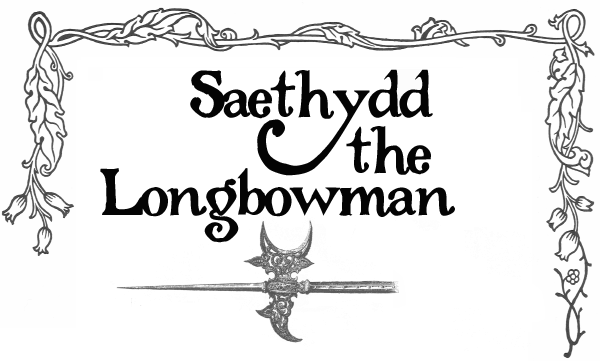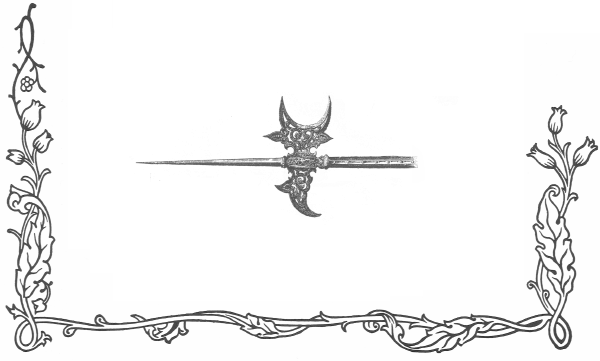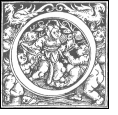
f all the longbowmen to travel from the valleys of Wales, Saethydd of the village of Aberteithiwr was the most renown. Even as a boy, when his young arms had barely known the strength to pull a longbow, Saethydd had been graced with a keener eye and a more unerring aim than any man of his village. When he himself grew to be a man, his proficiency with a longbow brought him to France, where he learned the most manly sport a longbowman might have hoped to enjoy.
He learned to kill Frenchmen.
In fact, killing Frenchmen wasn’t considered all that sporting by Saethydd and his companions, largely because it was so ridiculously easy. French knights would thunder onto a field of battle, redolent of garlic and proud of moustaches which often sheltered a family of four in relative comfort, and wave their swords at a line of Welsh bowmen a quarter of a mile away. They would typically curse a great deal, but as they did so in their own incomprehensible tongue, Saethydd was never certain whether he was being taunted or asked for directions to the nearest brothel.
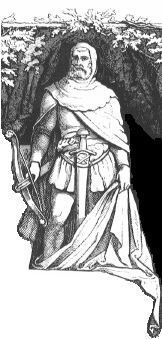
It didn’t really matter, as Saethydd had discovered about three minutes into his first pitched battle with the French. Perhaps having a culturally poor grasp of distance, the French knights had clearly failed to observe that while the swath of a fine, hand-crafted French sword was almost four feet, the range of a Welsh longbow was about a quarter of a mile.
With the predictability of the sun rising and elected officials lying, the brave knights of France got about half way through their second boastful insult when they all began falling off their horses, writhing about in the muddied soil of the battlefield and becoming singularly dead.
At the battle of Agincourt in 1415, Saethydd personally killed enough Frenchmen to cause a noticeable increase in the snail population the following spring, as mollusks of all kinds in and around France found themselves confronted with reduced predation. While his fellow bowmen were content to simply shoot whichever Frenchmen got in the way of their arrows, Saethydd accepted wagers that he would dispatch that particularly short Frenchman with a missing eye, or the really ugly one on the end with the coat of arms that looked like five lizards engaging in an unnatural act. By the end of the day he was cheerfully predicting which reproductive organ, nostril or food stain each of his arrows would pierce.
Saethydd knew too the secret gesture of contempt which the Welsh longbowmen reserved for their French adversaries. To taunt the knights who were soon to die beneath a hail of their arrows, they would thrust into the air the two fingers by which they drew their bows.
After many years of pulling his mighty bow, there came a day when even the gurgling pleas of distant foreigners drowning in pools of their own bodily fluids were no longer a comfort to Saethydd. Most of the companions of his youth had returned to their farms and villages in Wales, and he knew that it was time that he, too, left the verdant meadows, impenetrable forests and increasingly common mass graves of northern France for the land of his birth. He quit France for the last time with tears in his aged eyes and enough French gold in his luggage to have snapped the spines of lesser men.
On the afternoon when Saethydd arrived in Aberteithiwr, he was greeted by a legion of its townspeople. Many of them had not been born when Saethydd had first left for France, and few of the rest had been sober, but they had all been regaled by the stories of his many famous victories. As he strode along the highstreet, he was surrounded by a great cheering throng and hoisted upon their shoulders. They bore him through every lane and avenue of Aberteithiwr, a journey which lasted a little over three minutes. When they finally ran out of roadworks, they carried him to his house, where his daughter Cartheig was waiting with a flagon of ale and a hearty meal for her famous father.
That night, for the first time in more years than he could easily count, Saethydd the longbowman slept in his own bed, and heard nothing of the distant sounds of French knights trying to pry arrows out of their noses.
When Saethydd awoke the next morning, he found himself confronted by a young woman in his garden. She was wearing surprisingly little, and she smiled alluringly as Saethydd ventured down to the stream to bathe.
"Good morning, young lady," Saethydd said as he walked.
The woman nodded, her eyes dusky and glittering in the newly risen sun. "I’ve never been with a serious war hero," she said in a deep voice. "I spent the night with a farrier who said his great-great-great-grandfather fought at the battle of Bannockburn, but I don’t think that’s the same thing at all. I feel there’s so much energy and passion in a man who’s actually killed swarthy people in another country. Want to slip into the woods for a quick shag?"
Saethydd glanced at the woman for a moment longer. "Are you a Spaniard?" he inquired.
The woman shook her head.
Saethydd rubbed his chin in contemplation. "That’s the only possible explanation I could think of," he muttered, largely to himself. He resumed his journey to the stream. The woman was still speaking behind him, carrying on about crystals and plateaus of cosmic energy.
When Saethydd returned from his bath, he found two young men waiting outside the door to his house. Each held expertly-crafted longbows and quivers of pristine arrows. The first of them strode forward to greet Saethydd. "Good sir knight," he began reverently.
Feeling his features contort in irritation, he forced himself to smile thinly at the fellow. "Adequate sir toady," he replied.
The young man seemed not to notice an insult which would have been answered with a stout oaken club across the head by any of Saethydd’s contemporaries, but rather, bowed before the legendary warrior "I am honored that you know my name, sir," he said. "Myself and my friend Siomedigaeth here have come in the hope that you might deign to shoot against us in a competition of archers. It would be a great privilege, and the rest of the village would be most awfully impressed."
Saethydd regarded the two young men thoughtfully. "Are you well experienced in the way of the longbow, then?" he inquired.
Toady turned to address Siomedigaeth in determined whispers for a moment. After a few words, he returned his attention to Saethydd, nodding enthusiastically. "Yes we are," he replied belatedly. "We’re pretty sure these things work by directing the pointy bit at whoever you want to put a hole in and pulling back on the long stringy part as hard as you can."
"You two were sent here by the cursed French to get our women pregnant and breed a generation of drooling idiots, weren’t you?" Saethydd inquired pleasantly. Toady turned to address Siomedigaeth once more, but Saethydd decided that he wished not to know the answer to his question after all, and he strode into his house while they were conferring.
Saethydd entered the modest hall of his house to find his daughter Cartheig crouching over his table. The table was piled high with jerkins and shirts, upon which Cartheig was busily working embroidery. The great longbowman watched his beloved daughter for a time before he interrupted her. "What manner of apparel is this?" he asked jovially.
Cartheig paused in her stitchery. She held one of the garments before herself for her father to read. It said:
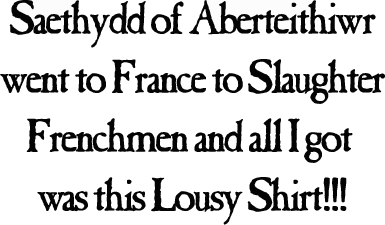
"Isn’t it just brilliant?" she asked excitedly. "Mr. Ffieiddio’s Apothecary and Gift Shop in the high street has ordered two hundred of them by Friday."
Saethydd’s arms grew taut. "What manner of yard should wish to array himself thus?" he demanded.
His daughter smiled fetchingly, an expression which had served to avail her of her own pony when she had been a child and to dissuade her father of removing one or more limbs of several of her boyfriends when she’d been older. "You’re greatly popular, father," she explained calmly. "You’ve made everyone in the village forget all about the pet rocks they purchased in prodigious numbers a mere fortnight past. You’re a great inspiration to every man, woman and squalling, fetid little child crawling about in the muck of the streets of Aberteithiwr, and a vast marketing opportunity as well. Deal with it."
Saethydd felt his face redden despite his love for his daughter. "I did not spend many years in France and create untold patches of tall grass in the shape of dead Frenchmen just to be worn over the distended beer-guts of accountants," he said threateningly.
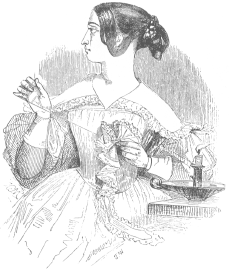
Cartheig’s eyes softened. "Oh, dear father, trouble yourself not," she said soothingly. "I most surely understand." She rose to approach him. "There’s to be a handsome royalty for you on every item sold, payable within thirty days after the conclusion of each quarter, based on a sliding scale of the gross product distributed and adjusted for projected returns and minimal spoilage and a min-max count range, minus any state and local taxes deducted at source." She stepped away from him, regarding his weathered features for a moment. "Would you have a few hours to sit for a portrait?" she asked at length. "I’m thinking of putting your face on some sweatshirts."
Saethydd glanced about the interior of his house, hearing a great thundering in his ears which he decided was very possibly his brain threatening to explode. "I’ll have to get back to you on that one," he said, and he left as he’d entered. Toady and Siomedigaeth were waiting for him, and he quickly crushed the throat of the one as a warning to the other.
It was with some relief that Saethydd discovered that the public house in which he and his friends had caroused in the heady days of his youth still stood, although the signboard which swung listlessly in the breeze above it had been changed. Upon reflection, Saethydd decided that The Mouse and Maggot was not an improvement over the name he recalled, Lord Slothenby’s Windpipe, but he was comforted to find that the interior of the public house remained unchanged. He pushed the cadaver of an aging patron from the nearest seat and called for a flagon of his favourite tipple, Edward Creach’s Viciously Cruel Green Ale.
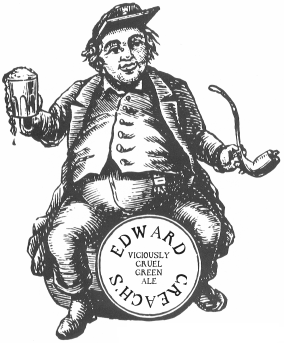
The landlord was preparing to subdue a pitcher of the drink when a hand with immaculately manicured fingernails appeared from the shadows of the room. "Halt," a voice said from behind Saethydd. "I shall pay for this one."
Saethydd turned to regard the owner of the hand, considering whether he should grasp it in appreciation or possibly remove it and use it as a shoe tree. A clean-shaven face with a single eyebrow and the expression of a man who sold things to other salesmen smiled back at him. "Who the hell might you be?" Saethydd inquired with rapidly deteriorating patience.
The man nodded as if he’d been anticipating the question. "Don’t you remember me?" he asked incredulously. "Just before you went off to France to bring pride and honour to the village of Aberteithiwr, you stopped by the rat-choked stinking abscess of a shop where I worked and demanded to sharpen one of your mighty arrows against the side of my head."
Saethydd allowed that he did not recall the event, but in those excited days before he had taken ship for the continent he had sharpened a lot of arrows against the sides of a lot of heads. Even now he was mildly surprised that there had been so many utter weasels who’d been prepared to permit him to do so.
The man continued. "Buying you a drink would be an honour, nay, a priviledge, nay, a blessing bestowed upon the entire village of Aberteithiwr, nay, a personal sign of distinction from God Himself and at least a dozen of his more muscular angels. I could go to my cold, hastily-dug grave under a deep swamp of partially-composted pig droppings with a delighted smile on my decomposing countenance were I to take with me into the afterlife the knowledge that I had graced your most noble lips with a moment of gastronomic pleasure."
Saethydd parted his noble lips to speak, thinking that the man had completed his oratory. In point of fact, he’d merely paused for breath, and was clearly preparing himself to attain a hitherto unexplored plateau of sycophantic self-denigration. "My graceless, unworthy ancestors, dating back to the eighth-century Toerag the Malodorous..." he continued. Saethydd raised his gnarled hand for silence and the man halted in mid-pucker.
"Were I to be granted the opportunity to rip out my pancreas for the amusement of your domestic chickens..." he offered. Saethydd glared at him.
"No greater pleasure could I desire than the rapturous distinction of being dragged behind your horse..." he suggested, his tone now growing uncertain. Saethydd unsheathed a small sword he’d removed from the hand of a French knight near Alsace, wondering at the time where the rest of the knight had gotten himself to. He now carried it to clean his teeth. The man beside him whitened noticeably, his face the colour of the newly discovered bones of saints which were often for sale by the pound in larger villages on the continent.
"If I let you buy me a drink and I don’t make you sign anything vowing never to tell your friends about it, will you promise to piss off and not trouble me again?" he inquired, gesturing menacingly with the sword.
The man nodded enthusiastically. "By all the noble kings of Albania, should I break this vow I shall laugh with pleasure whilst my very heart is clawed from my breast by the reeking fangs of carnivorous sludge-tapeworms," he agreed.
"There’s no such thing as a carnivorous sludge-tapeworm," Saethydd interrupted.
"It would be my orgasmic fulfillment to spend the rest of my days in vain searching for a sorcerer sufficiently gifted to call such a creature into being such that it might claw my very heart from my breast whilst I laugh with pleasure," he offered.
Saethydd considered for a moment the potential entertainment value in taking the man up on his offer. After some consideration, he decided otherwise. At the very least, he’d be subject to at least thirty years of progress reports, likely to be concluded by watching the questionable table manners of a really large intestinal parasite he was presently happier believing was imaginary. He gestured to the landlord.
"This pungent little syphilitic canker of a man wishes to buy me a drink," he called. "See that he has one as well."
The man flushed with pride. "Good sir, I feel I am hardly worthy," he said.
Saethydd nodded his agreement.
"Will he be having the same as you?" the landlord inquired.
"I insist on it," Saethydd replied.
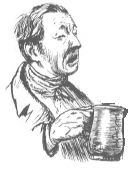
The landlord brought a flagon of Edward Creach’s Viciously Cruel Green Ale and placed it before the man, who downed a generous swallow. He showed greater fortitude than Saethydd had originally granted him, standing with the drink in his hand for almost a minute before it began to consume his stomach and dissolve his internal organs. His eyes did grow rather wide and horrified when his left leg detached itself in a cloud of emerald-hued steam and he toppled to the floor of The Mouse and Maggot. He lay quivering in a spreading puddle of unnamable stains as he melted away.
"Shall I fetch a mop?" the landlord inquired, leaning over his counter.
"Perhaps you’d best do so," Saethydd observed distinterestedly. "Most taprooms of my experience which serve Edward Creach’s Viciously Cruel Green Ale come equipped with drains for moments such as this."
Saethydd spent much of the remainder of the afternoon in The Mouse and Maggot, and the landlord got through a good many mops. When Saethydd finally strode back into the dwindling light of day, it surprised him not to find that a dozen monks from a nearby monastery had arranged themselves into a human pyramid for his entertainment, with the uppermost monk daubing himself in pitch and preparing to set himself alight to afford Saethydd better illumination and not strain his noble eyes.
The modest house of Saethydd the longbowman was scarce discernable when its owner returned to take refuge in it. It was surrounded by a crowd of people large enough to have carved out a significant portion of Wales, erected a sail and floated it away to form their own country. Saethydd pushed brusquely through them, not above crushing the odd foot or cracking an occasional pelvis in his passing. Mothers wept with joy that their newly-crippled children should be thus honoured.
At the nexus of the crowd, enthroned like the queen of a hive of bees with nothing better to do with their lives, Saethydd’s daughter stood behind a small table. She had one of her father’s arrows before her, and a number of enthusiastic onlookers were gazing covetously at it. "This arrow ended the life of a French knight named Gerrard d’Pied au Cochon," she was explaining. "He weighed over twenty stone, and rode two horses into battle. He was known to be able to kill a man at fifty paces by shouting, and he had intimate relations with demons on a regular basis. All bids must be in gold, and payment is to be made at the time of delivery. Who will start me with two sovereigns?"
An overweight woman wearing a chain-mail wimple and a metal ring in her nose raised her hand uncertainly, but Saethydd pushed past her before Cartheig could acknowledge her bid. He grasped his daughter firmly by her arm and propelled her into the relative calm of his house. She stared at him with sudden alarm.
"Please let me go, dear father," she said urgently. "There is only another hour of daylight left, and I haven’t even begun to sell the decorated skulls of your fallen enemies."
Saethydd wondered fleetingly if perhaps his afternoon spent with Edward Creach’s Viciously Cruel Green Ale hadn’t damaged his senses more than he’d initially allowed. "I left the skulls of my fallen enemies buried in France," he said harshly, "along with all their other parts. Where would you have gotten hold of them?"
Cartheig attempted to appear demure. "It embarrasses me to say that none of your fellow villagers seem able to discern the skull of a fallen French knight from that of a dead gluemaker’s apprentice I had a boy dig up for me this morning," she confessed. "I do think I did a perfectly stunning job of decorating it, though."
"You cannot mean to be deceiving your own people," Saethydd exclaimed.
"Deception is such a dogmatic concept," Cartheig said. "Whoever buys the decorated skulls of your fallen enemies will think they’re real enough. They’ll have something to show off to their friends, a useful door stop or a place to put hot cups... I fail to see the harm in granting them a few moments of happiness."
"And who the hell is Gerrard d’Pied au Cochon?" Saethydd demanded? "I never actually inquired after the names and personal habits of Frenchmen before they died."
Cartheig smiled sweetly. "Well then, you can’t be certain that he wasn’t one of the ones you killed, father. I’ve heard that they’re all d’something or other over there."
"I believe that there is a substantial possibility that I’m losing my reason," Saethydd remarked, more to himself than to his daughter.
Cartheig embraced her father. "I pray that it is not so, father," she said earnestly. "I’m almost out of arrows with real French blood on them, and I was hoping you could wield your mighty bow and fire a few into a cow I’ve purchased for the occasion. I don’t think the punters will know the difference."
Saethydd the longbowman was silent for a time. At length he summoned his daughter to his side at the hearth of his modest home. When he spoke, it was with a profound note of weariness in his voice. "The world to which I have returned is not as I left it, my child," he said softly. "I should like you to listen very carefully to me now..."
Cartheig listened to her father and said little, as he prodded her with the point of his sword whenever she opened her mouth to speak. When he had said his piece, he retired to his bed.
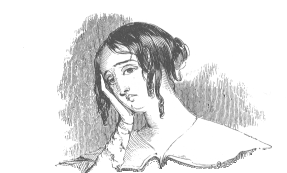
In the morning, Cartheig rose from her bed to find her noble father gone from the house. The front garden was, as she had expected, already thick with people of Aberteithiwr, who had come to purchase bundles of her father’s old socks, which when they’d been ripe had proven to be almost as lethal to the French as his arrows. She ignored them, walking hurriedly to the nearby stream. There she found what she’d most dreaded — an empty vat of Edward Creach’s Viciously Cruel Green Ale, a box of matches and a charred heap of ash. She cried out with all the anguish and rage she could command.
"My noble father, Saethydd of Aberteithiwr, has doused himself with a flammable liquid and burned himself to death," she shrieked. Hundreds of townspeople flocked to the stream. Many offered as much as ten sovereigns for a handful of ash.
The good people of Aberteithiwr plunged themselves into mourning. Men who’d never actually met Saethydd the longbowman drank to his name, but as rule, not with a flagon of Edward Creach’s Viciously Cruel Green Ale. The officials of the village offered glorious eulogies in his name for weeks after his demise, seeking to outdo each other in praise and flummery. By the time it became polite to once again speak of something other than the valor, courage, aim, thrust, insight, cunning, strength, stamina, noble gaze, proud countenance, fleet foot, mighty fist, broad chest, fiery beard and peculiarly-shaped right ear of Saethydd, the legends wreathed about him had accounted for his dispatching more Frenchmen than had trod the roads and planes of France in the previous two thousand years.
The spring of Saethydd’s return to Aberteithiwr and his subsequent toasting by his own hand drew into summer, and thence into fall. The grief of the villagers became muted with the changing of the seasons, and life in Aberteithiwr returned to the slow plodding of horses’ hooves, the calling of women from their yards, the cries of children and the unpleasant cracking sound cats make when someone drops a boulder on them.
So it was that Cartheig was walking in the hills above Aberteithiwr one afternoon in the last days of autumn when she encountered Saethydd the longbowman lazing in the grass, peering down into the village. The village was a great welter of activity, with a congestion of stonemasons at work in the square chipping, cleaving and exchanging secret handshakes.
"How does your demise go, father?" she inquired cheerily.
"Very well, my child," he replied.
"I don’t suppose you’ve uncovered any more arrows with French blood on them?" she continued. "They’re selling for fifty sovereigns in some quarters."
"Don’t push your luck, daughter," he said.
She eased herself into the grass beside her father. "Do you really think it was necessary to make them believe that you’d killed yourself?" she inquired. "They were most disheartened to think that so magnificent a hero would wish not to be among them."
Saethydd spat. "I preferred the company of the French. At least I could slay them and mutilate their vile, lifeless bodies when the mood took me."
"But they revere you, father," Cartheig insisted.
Saethydd’s features softened. "Very well," he relented. "You may circulate the rumour that I perished by mischance in a freak kitchen accident if you feel it will comfort them. They’ll believe such a thing... few of them struck me as being terribly bright."
"That’s most kind of you," she said.
Saethydd stared for a time into the town. "What exactly are all those fat fellows with hammers and chisels up to down there?" he asked.
"They’re constructing a monument to you, father," Cartheig replied. "It is to be a grand statue with a fountain, a mechanical clock and a gift shop in the foundation."
Saethydd’s heart sank in a way usually reserved for granite sailing ships. "I can scarce believe it," he cursed. "Someone really must help them get a life."
"They don’t need one," Cartheig said. "They have yours."
Saethydd leapt to his feet. "Damn them," he said. "I will not be an attraction for tourists."
"What do you mean to do?" Cartheig asked.
"I shall stride boldly into the mayor’s office and demand that work on that monstrosity cease," he proclaimed. "Perhaps they can convert what’s already been done into a public convenience."
"But father, you’re dead!"
"If that thing is completed, I vow that I shall have company," Saethydd muttered.
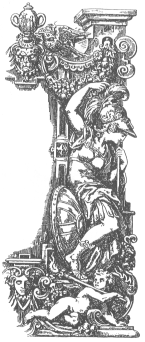
The mayor of Aberteithiwr was not as pleased to see Saethydd as the aging warrior might have hoped. A rotund, bug-eyed toad of a man who could not have counted the disfiguring diseases he’d contracted on the fingers of both his hands even if both his hands had possessed fingers, he leapt from his chair at the sight of Saethydd and began to cross himself and plead not to be taken unto the sulphurous depths of Hell before Saethydd had a chance to so much as threaten him with dismemberment. Saethydd was uncertain whether the mayor was more frightened that he was returned from the grave, or that he might not be.
"What is the meaning of that?" demanded Saethydd, gesturing at the statue taking shape beyond the mayor’s window.
The bulbous figure turned to follow Saethydd’s outstretched finger. "Oh yes," he said timorously. "Isn’t it magnificent?"
"It looks like something a Frenchman would keep his least favourite mistress in to prevent her tattoos, scabs, boils and peg-leg from bringing disgrace onto his already loathsome household," Saethydd replied.
"But it’s in your honour, good sir knight," the mayor pleaded.
"If it’s in my honour, who is that great poncing girl’s blouse atop it?" Saethydd bellowed.
The mayor squinted into the autumn sunlight. "That’s yourself, noble sir," he replied.
Saethydd felt his blood rage through his veins and begin to scald the interior of his head. "Whoever is atop that monument has perfect teeth, long flowing hair, nipples the size of cannon balls and wings on his feet." He paused for effect. "Do you see wings of any sort on my feet?"
The mayor did in fact inspect Saethydd’s feet, and seemed to be in agreement that no wings were visible thereon.
"It is a magnificent edifice none the less," he said. "It has the largest mechanical clock in the shire."
"It’s located in what is intended to be my belly," Saethydd interrupted him. "I dread to think what it uses for a pendulum."
"People will flock to Aberteithiwr to view it," the mayor said earnestly. "They will come bearing flowers to leave in your honour, singing ballads composed by our official village tunesmith in consideration of a modest service fee... they will sup in the taproom where you spent your last afternoon on this earth, with a slight additional cover charge... they will purchase authentic relics of your life made by specially appointed local craftsmen... they will pay extra for the privilege of actually touching the towering stone which bears your likeness."
The mayor paused, clearly having winded himself. "They will make this town very, very rich, good sir knight," he explained. "Surely the prosperity and security of Aberteithiwr is what you went to France to fight for in the first place."
"I went to France to kill Frenchmen," Saethydd barked. "That’s the only place there are Frenchmen in sufficient numbers to make the whole effort worthwhile."
"Your shrine will make the people of Aberteithiwr very wealthy," the mayor pleaded.
"I shouldn’t think it will after I stand atop it and prove that I don’t look anything like myself," Saethydd threatened him.
The mayor sighed. "Please step to my window and view this grand work, good sir knight, I beg thee," the mayor asked of him. "I feel certain that you should change your mind once you do."
Saethydd had no interest in changing his mind, deciding at that moment that he was more than satisfied with the mind he had. None the less, he foresaw a good half hour of pleading by the mayor were he not to say something nice about the ugly statue in the town square. He permitted himself to be guided to the window, where he gazed at the stonework beyond. It was very much more repugnant up close, he decided.
The mayor of Aberteithiwr drove a dagger through Saethydd the longbowman large enough and sharp enough to have caused dragons to sing in a higher register. It pierced his noble heart as the sword of no French adversary had succeeded in doing, and the life had fled from Saethydd’s eyes before his weary head reached the floor.
The mayor regarded him for a moment before he turned to summon his assistant. "Dead heroes are so much less trouble than lives ones," he mused.
|
